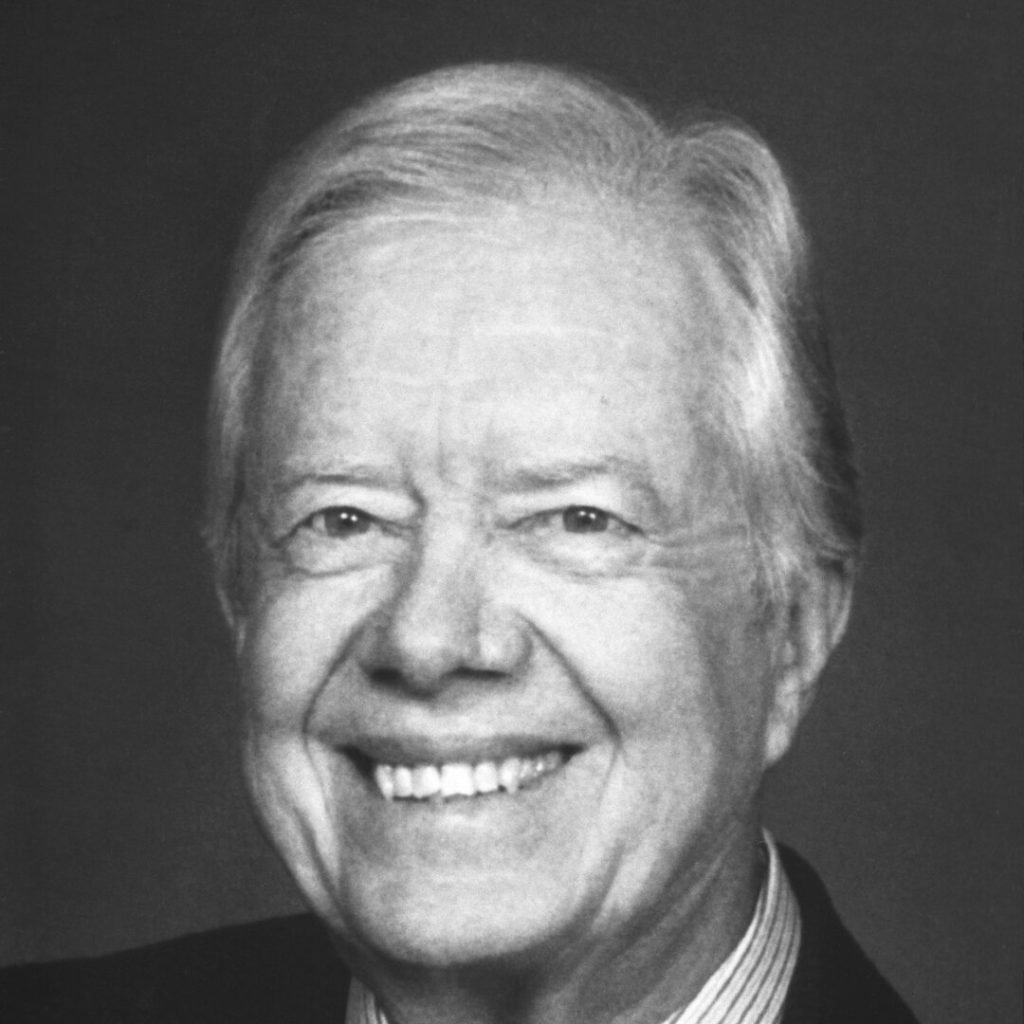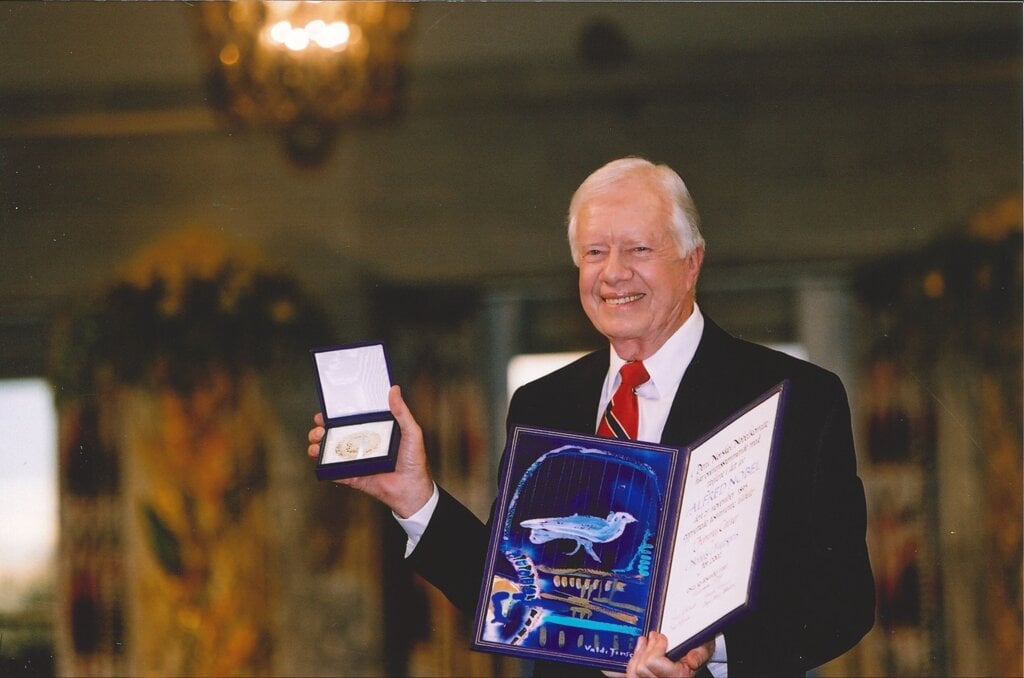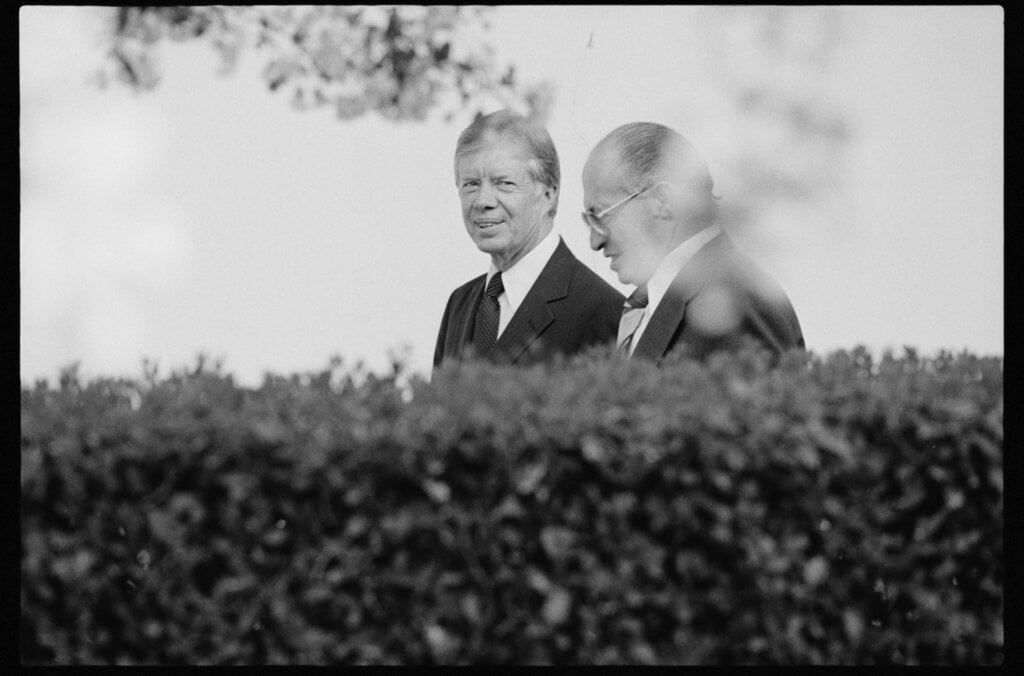Jimmy Carter
Speed read
Jimmy Carter was awarded the Nobel Peace Prize for his decades of untiring effort to find peaceful solutions to international conflicts, to advance democracy and human rights, and to promote economic and social development.

Full name: James Earl Carter
Born: 1 October 1924, Plains, GA, USA
Died: 29 December 2024, Plains, GA, USA
Date awarded: 11 October 2002
An active former president
While US President George W. Bush laid plans to attack Iraq in autumn 2002, former President Jimmy Carter was awarded the Nobel Peace Prize for his efforts to promote peace and mediation, human rights and social welfare. The Nobel Committee chairman said that Carter should have received the peace prize in 1978 for mediating a peace accord between Egypt and Israel. In 1976 Carter won the election on his reputation as an honest, devout Christian. He began his presidency by mediating the peace accord, but by the end of his term, he faced conflict with Iran and a new cold war when the Soviet Union invaded Afghanistan in 1979. One year later, Carter lost his re-election bid to Ronald Reagan. Since his presidency, Carter has become an active peace mediator who sometimes opposes US government policy.
"In a situation currently marked by threats of the use of power, Carter has stood by the principles that conflicts must as far as possible be resolved through mediation and international cooperation based on international law, respect for human rights, and economic development."
- The Norwegian Nobel Committee, Announcement, 2002.

The idealistic president
In 1976, the Democrats nominated the governor of Georgia, Jimmy Carter, as their presidential candidate. His opponent was Gerald Ford, who had taken over as president after Richard Nixon’s enforced resignation. With the American people traumatised by the controversy surrounding the Vietnam War, Carter won the election because he was seen as a new and honest politician with the integrity and ideals of a “re-born” Christian. Although Carter’s main objectives concerned domestic policy, his greatest triumph as president was the implementation of a new Middle East policy.
| Democracy Greek for government by the people. A form of government in which all adult citizens participate in the governing of the state and everyone is equal under the law. Most democracies are representative governments. Individuals are elected to assemblies that take decisions on behalf of all citizens. |
| Human rights Rights that apply to all persons regardless of gender, race, ethnicity, religious affiliation or nationality. The most important are the rights enshrined in the UN Declaration of Human Rights, adopted in 1948. |
Criticism of Israel and the USA
Since the terrorist attacks on the US in 2001, Carter has criticised both US and Israeli policy as misguided for achieving peace in the Middle East. Carter stresses his friendship with Israel but disagrees strongly with its policy of occupation and its treatment of Palestinians. Carter also caused a stir by claiming that Israel had 150 nuclear weapons. He believes that dialogue with your enemies is vital for achieving peace. Accordingly, Carter has met leaders of the Islamic movement Hamas, which both the US and Israel have claimed is a terrorist organisation.
Carter and the Middle East
In 1967 Israel seized the Sinai Peninsula from Egypt. Six years later, Egypt tried to regain control of the region. US Secretary of State Henry Kissinger negotiated a ceasefire, and when Jimmy Carter became president in 1977, he set out to achieve a lasting peace between Israel and Egypt. Carter invited the two leaders, Anwar Sadat of Egypt and Menachem Begin of Israel, to meet at Camp David in the USA. With Carter as mediator, the two leaders reached a peace accord, for which they both received the Nobel Peace Prize in 1978. Still in effect today, the peace accord between Egypt and Israel probably would not have been reached without Carter’s efforts.

"Along with his steadfast wife, Rosalynn, Carter has become a true citizen of the world, working to build societies in which the human spirit can prevail and where freedom and democracy can flourish."
- Douglas Brinkley: The Unfinished Presidency. Page XV, Viking 1998.
Actively seeking peace
Jimmy Carter served just one term as president. In 1979, radical Muslims in Iran took US citizens hostage, and by the time Carter was able to gain their release, the presidential election against Ronald Reagan was lost. But Carter has not been a passive former president. He founded the Carter Center in Atlanta with the maxim “waging peace, fighting disease, building hope.” Since the 1980s, the Carter Center has worked to promote democracy, safeguard human rights, mediate conflict and fight disease throughout the world. Carter has also spoken out several times against US foreign policy.
"War may sometimes be a necessary evil. But no matter how necessary, it is always an evil, never a good."
- Jimmy Carter, Nobel Prize lecture, 10 December 2002.
Learn more
Jimmy Carter (James Earl Carter, Jr.), thirty-ninth president of the United States, was born October 1, 1924, in the small farming town of Plains, Georgia, and grew up in the nearby community of Archery ...
Disclaimer: Every effort has been made by the publisher to credit organisations and individuals with regard to the supply of photographs. Please notify the publishers regarding corrections.
Nobel Prizes and laureates
Six prizes were awarded for achievements that have conferred the greatest benefit to humankind. The 12 laureates' work and discoveries range from proteins' structures and machine learning to fighting for a world free of nuclear weapons.
See them all presented here.
